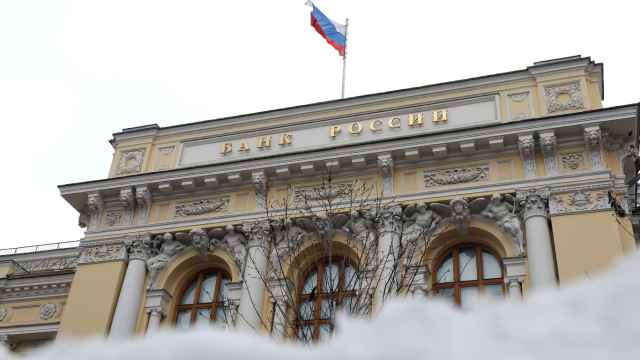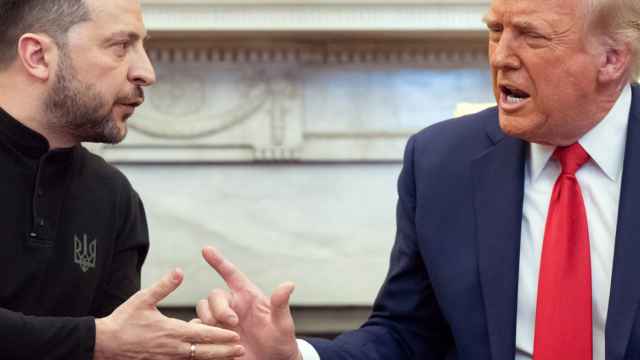The Economist Intelligence Unit, or EIU, has just issued a report on doing business in Russia. Titled "Nothing Ventured, Nothing Gained: Changing International Perceptions of Russian Business," it is based on a survey of 195 senior executives from outside Russia, with particular focus on those who have been or are considering signing joint ventures with Russian corporations.
"Non-Russian executives have decidedly mixed views of their Russian partners," the report notes. "Access to energy, financial resources and technical know-how are the big pluses. … Poor language skills, inefficient management and corporate governance are the big minuses."
Third on the EIU's recommended list of nine ways for Russian companies to break free of outsiders' stereotypes is to "avoid insider practices and back-room deals."
Oh, and one other thing. The study was commissioned by Russian aluminum giant RusAl. The irony is rich since RusAl's billionaire owner, Oleg Deripaska, just seems to have participated in one of the biggest back-room deals imaginable. At stake is the ownership of Russian metals giant Norilsk Nickel, one of the world's leading suppliers of nickel, copper, palladium and platinum.
Deripaska, the second-largest shareholder in Norilsk Nickel, and Vladimir Potanin, the largest shareholder, have been taking potshots at each other ever since RusAl picked up a 25-percent stake in Norilsk at the height of the financial crisis in 2008. Deripaska has flung repeated allegations of poor corporate governance, questionable share buy-backs and just about everything else at his rival tycoon. Potanin, who has repeatedly offered to buy out Deripaska, has denied all of these charges.
The battle has raged through numerous Russian courts and was due to go before a London arbitration court before a compromise deal was announced a week ago. Enter stage left a third billionaire, Roman Abramovich, co-owner of the Evraz steel giant. Abramovich's investment vehicle, Millhouse Capital. will buy a 7.3-percent stake in Norilsk, valued at $2 billion, and then transfer it into an escrow account. The other two feuding oligarchs will each transfer equivalent stakes into the same account, with the resulting 22-percent stake to be voted on by Millhouse.
Abramovich becomes de facto controller of the board in a deal, to quote RusAl's press release, aimed at "integrating the efforts of all parties to maximize profitability and shareholders' value, as well as delivering improvements to the existing corporate governance structures."
It's a very Russian solution.
Non-Russians laboring under what the EIU report calls "stereotypes" about Russian business practices might be forgiven for wondering how a third Russian tycoon is going to help make things better. Unless, that is, Abramovich really represents Norilsk's longest-standing "invisible" shareholder, namely the Russian state.
The history of Norilsk Nickel is inextricably entwined with the Kremlin. It was originally established in 1933 as Norilsk Correctional Labor Camp by the NKVD, the Soviet Union's political police and the precursor to the KGB. Norilsk remained a strategic city right through the Soviet era, and the umbilical link to Moscow remains although control of the company passed to Potanin's Interros Group in the 1990s. President Vladimir Putin has repeatedly cajoled Potanin and Deripaska to end the feud, even summoning both billionaires to a meeting with him and Norilsk management in September 2010.
In August, Putin expressed "hope all their disagreements will be resolved in the interests of [Norilsk Nickel] operations and the people who work at its plants." He didn't give any particular reason for that optimistic assessment, but his comments were widely interpreted as a sign that the Kremlin was going to up the back-room pressure somehow. Quite how is now starting to become clear.
Does any of this infighting amount to anything more than a typically Russian piece of corporate theater?
Well, yes. At stake are the fortunes of two of the largest Russian corporate entities and two of the largest players in the global metals markets. The final deal, still being hammered out behind closed doors, will determine both companies' fortunes for a long time. At the heart of this dispute is the level of dividend payable by Norilsk to its shareholders — first and foremost Deripaska.
RusAl is burdened with massive net debt of $10.7 billion with operating profitability dragged down by its almost total focus on aluminum, the price of which is languishing at the top end of the cost curve. The Norilsk dividend is an important financial offset, which is why Deripaska has repeatedly called for it to be raised. Raise it too far, however, and Norilsk becomes even more of a cash cow for its shareholders, undermining its ability to invest in its own core business. The size of the dividend going forward is going to mean a lot for each company.
There is also the not-so-little matter of how Norilsk markets its metal, another long-standing focus of criticism by Deripaska. The RusAl press release on the proposed deal with Millhouse cites the potential for "large-scale adjustments of [Norilsk Nickel's] strategy, sales policy and dividends policy."
Given that Norilsk is one of the world's largest nickel producers, changes to its current sales policy could have far-reaching market impact, particularly if Deripaska is proposing the same sort of strategic alliance with Glencore International that exists with RusAl. A seven-year deal between the two companies commits RusAl to supplying a total 14.5 million tons of aluminum to the Glencore — all of which is being discussed by the three oligarchs in the sort of back-room deal lamented in the EIU's report.
Nor will the outcome, whatever shape it eventually takes, help dispel one of the most commonly held stereotypes about Russian business practices, namely the lack of transparency.
"Indeed, Russian companies score worst on transparency of any attribute covered in the survey (4.3 out of 10)," the EIU report notes.
Still, at least we're a little bit wiser as to who the real owner of Norilsk is.
Andy Home is a columnist for Reuters, which published this comment. The ideas expressed are his own.
A Message from The Moscow Times:
Dear readers,
We are facing unprecedented challenges. Russia's Prosecutor General's Office has designated The Moscow Times as an "undesirable" organization, criminalizing our work and putting our staff at risk of prosecution. This follows our earlier unjust labeling as a "foreign agent."
These actions are direct attempts to silence independent journalism in Russia. The authorities claim our work "discredits the decisions of the Russian leadership." We see things differently: we strive to provide accurate, unbiased reporting on Russia.
We, the journalists of The Moscow Times, refuse to be silenced. But to continue our work, we need your help.
Your support, no matter how small, makes a world of difference. If you can, please support us monthly starting from just $2. It's quick to set up, and every contribution makes a significant impact.
By supporting The Moscow Times, you're defending open, independent journalism in the face of repression. Thank you for standing with us.
Remind me later.






